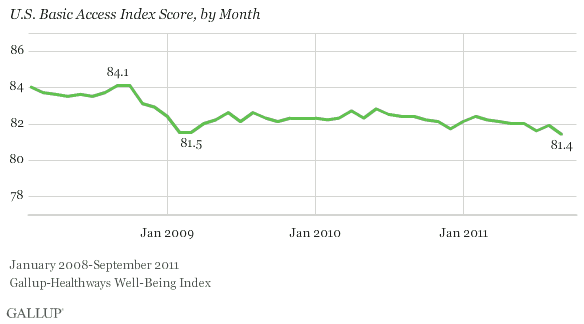Fewer Americans Can Afford the Basics
October 15, 2011 by Douglas A. McIntyre Among the large numbers of issues that are said to prove that the recession never ended is whether Americans can afford the “basics” that have been part of what the middle class has been able to expect for decades. Fewer and fewer Americans can. This means that a lack of demand for some services, like medical treatment, will undermine the ability of some services to exist at all — at least at current levels. Medicine, like any other economically based system, needs some base amount of demand to provide the financial scale that allows R&D and a delivery infrastructure to exist.
Among the large numbers of issues that are said to prove that the recession never ended is whether Americans can afford the “basics” that have been part of what the middle class has been able to expect for decades. Fewer and fewer Americans can. This means that a lack of demand for some services, like medical treatment, will undermine the ability of some services to exist at all — at least at current levels. Medicine, like any other economically based system, needs some base amount of demand to provide the financial scale that allows R&D and a delivery infrastructure to exist.
A new Gallup poll reports that “Fewer Americans had access to basic life necessities in September. The nation’s Basic Access Index score fell to 81.4 last month — on par with the 81.5 measured in February and March 2009 amid the recession.” This is a testament to the high unemployment levels of the past four years. The fact that the economy does not bleed jobs at the rate of 500,000 a month as it was in early 2009 does not help those who have lost jobs and not regained them. Some would say the joblessness trouble in the U.S. is not getting worse. That only means that the recession, which is still a horrible fact of the lives of most Americans, had not improved at all.
The two largest drops in “basics” are the number of people with a personal doctor, down 4.2% to 78.3% in September compared to September 2008. The number of Americans with health insurance coverage has dropped by 3.6% to 83.3% over the same period. At some point, the ability of hospitals and doctors to operate in current numbers falters. The same is probably true with expensive medical R&D. The government will only fund so much of it, particularly in an age of austerity. Private donations low because even the well-to-do have cut back charity.
The current recession does not feel like one. It is worse than that
Methodology: Results are based on telephone interviews conducted as part of the Gallup-Healthways Well-Being Index survey Sept. 1 – 30, 2011, with a random sample of 29,313 adults, aged 18 and older, living in all 50 U.S. states and the District of Columbia, selected using random-digit-dial sampling.
Douglas A. McIntyre
Sponsored: Find a Qualified Financial Advisor
Finding a qualified financial advisor doesn’t have to be hard. SmartAsset’s free tool matches you with up to 3 fiduciary financial advisors in your area in 5 minutes. Each advisor has been vetted by SmartAsset and is held to a fiduciary standard to act in your best interests. If you’re ready to be matched with local advisors that can help you achieve your financial goals, get started now.